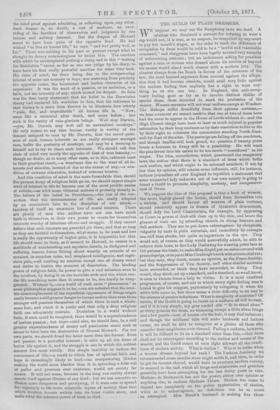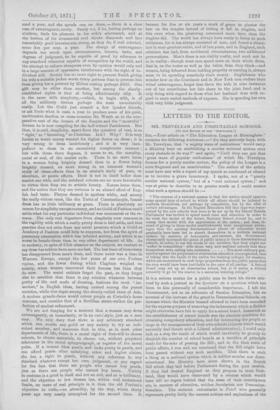THE GUILD OF PLAIN DRESSERS.
riding of the faculties of observation and judgment by one WE suppose we may say the Sumptuary laws are dead. A intense and solitary interest. But the despair of Howard mistress who dismissed a servant for refusing to wear a seems to have been quite of the opposite kind. He had cap would not, it is true, as we suspect, be compelled by any court
wished "to live an holiest life," he says, and had pretty well, eo to pay her month's wages, as the order to mark the difference of far." There was nothing in his past or present except what he occupation by dress would be held to be a " lawful and reasonable thought its dreary unmeaniugness to haunt him. The emotion command," and clergymen have been legally accused very recently
the opposite cause, the incoherent and leaden character of his tion that it had become obsolete, would avail very little against experience. It was the want of a passion, or an ambition, or a the modern feeling that anybody has a right to wear any-
faith, not the intensity of any, which caused his despair. So false thing lie or she can buy. In England, this anti-sump-
was the first hasty statement that his belief in the Darwinian tuary feeling goes so far as to involve distinct dislike of theory had rendered life worthless to him, that his reference to special dress, dress intended to mark the profession of the that theory is a mere item thrown in to illustrate how utterly wearer. Women-servants will not wear uniform except at Windsor.
" stale, flat, and unprofitable " all human life is. " Now, The Bishops suffer dreadfully from their epicene costume,—
some like a memorial after death, and some before ; but we hear a rumour we cannot confirm that one or two of them have such is the vanity of vain-glorious beings. Well may Darwin, had the sense to appear in the House of Lords without it—and the
—yes, Mr. Dar win may well call us naturalized monkeys." High Church clergy have been at least as much injured in popular
He only means to say that human vanity is worthy of the estimation by their long soutanes as by their resolution to live or die descent assigned to man by Mr. Darwin, that the moral petti- by their right to celebrate the communion standing North-East- ness of such human interests as are really strongest amongst and-by-East of the altar. The periwigs are falling off the coachmen,
men, befits the posterity of monkeys, and may be a warning to and though beadles still look grand, we question if twenty years himself not to try to share such interests. We should call this hence a footman in livery will be a possibility. He will want state of mind very nearly the opposite of that of true insanity,— the pins thrust into his calves to be too much " considered " in his though no doubt, as in many other cases, so in this, extremes meet wages. The idea, nevertheless, which penetrated the sumptuary in their practical result,—a weariness due to the want of alt in- laws, the notion that there is a standard of dress which befits terests and stimulus, instead of due to the excess of any,—a con- each station, and which ought to be enforced somehow, if not by
dition of extreme relaxation, instead of extreme tension. law then by opinion, still retains some influence, still, for instance, And this condition of mind is the more formidable that, should induces journalists all over England to republish a statement that the present decay of religious faith go on, we should expect simple some unmarried lady unknown out of her own county is going to want of interest in life to become one of the most prolific causes found a Guild to promote simplicity, modesty, and inexpensive- of suicide,—as with h some Oriental nations it probably already is, nose of Dross.
sand a year, and she spends one on dress, — there is a clear case of extravagance, surely. Surely not, if he, having perhaps no children, finds his pleasure in his wife's adornment, and at the bottom of his commercial soul thinks diamonds and lace remarkably good investments, rising, as they do, if well selected, some five per cent. a year. The charge of extravagance depends too much upon circumstances, income, taste, and degrees of judgment, to be capable of proof by reference to any standard whatever capable of recognition by the world, and the attempt to enforce cheapness even by opinion would only end in a large amount of oppressive interference with the right of in- dividual will. Society has no more right to prevent Smith giviug his wife a sealskin jacket worth thirty guineas than to prevent him from giving her a portrait by Millais costing perhaps £800. One gift may be sillier than another, but among the clearly- established rights is that of being affectionately silly. It is the same with simplicity,—which, to begin with, is of all the millinery virtues perhaps the most unendurably costly. Let the Guild just consult a few Quaker friends, or ask Poole what it costs a year to produce some of his quiet, unobtrusive dandies, or cross-examine Mr. Worth as to the com- parative cost of the dresses of the Empire and the " mournful " dresses ho is now compiling for the half-ruined Parisiennes. But then, it is said, simplicity, apart from the question of cost, is so " right," so " becoming," so Christian. Is it ? Why ? It is very foolish to waste money wanted for higher duties on dress ; it is very wrong to dress lasciviously ; and it is very inex- pedient to dross in an excessively conspicuous manner ; but with those three dogmas, it seems to us, the morality, social or real, of the matter ends. There is no more harm in a woman being brightly dressed than in a flower being brightly dressed, no more wrong in an innocent woman's study of dress-effects than in an orator's study of pose, or elocution, or poetic effects. Drab is not in itself holier than scarlet one whit, and the subdued colours are no more favourable to virtue than they are to artistic beauty. Nature hates them, and the notion that they are virtuous is an absurd effect of Eng- lish bad taste. Phryne dressed in spotless white, and among the really vicious races, like the Turks of Constantinople, female dress has as little brilliancy as grace. There is absolutely no reason for simplicity Dxtopt.economy, and no Guild of Fashion could settle what for any particular individual was economical or the re- verse. The only real departure from simplicity now common is the rapidity with which a really pretty dress is laid aside, and that practice does not arise from any social pressure which a Guild or Academy of Fashion could help to suppress, but from the spirit of pecuniary ostentation which has infected society, and which is no worse in female dress than in any other department of life. As to modesty, iu spite of Club clamour on the subject, we venture to say dress has seldom been more modest. The last trace of immodesty has disappeared from men's dress, and there never was a time iu Western Europe, except the few years of our own Puritan regime, and the fewer during which Clapham weighed on society, when women uncovered their bosoms less than they
do now. The social satirists forget the past, as they forget also to establish that there is any relation whatever between purity of life and mode of dressing, fashions the most " im- modest," in English ideas, having existed among the purest societies, while vice rages among the closely-veiled races of Asia. A modern grande-dame would colour purple at Cornelia's home costume, and consider that of a Sevillian street-walker the per- fection of modest refinement.
We are not denying for a moment that a woman may dress extravagantly, or immodestly, or in an Quin! style, just as a man may. We only deny that there is any arbitrary standard which can enable any guild or any society to try an indi- vidual member, and maintain that in this, as in most other departments of lifoothere is a moral right of free-will to choose colours, to choose materials, to choose cut, without perpetual references to the moral sphygmograph, or register of the moral pulse. If a woman likes pearls, and looks pretty in pearls, and can afford pearls after satisfying other and higher claims, she has a right to pearls, without any reference to any standard whatever except her own judgment, or any regard for the fact that there are people who cannot buy pearls, just as there are people who cannot buy boots. Variety in costume is a good in itself and not an evil, and so is brilliancy, and the objection to low dresses has, within well understood limits, no more of real principle in it than the old Puritan's objection to curls,—an absurdity, by the way, which thirty years ago very nearly triumphed for the second time. It
became for five or six years a mark of grace to plaster the hair ou the temples instead of letting it fall in ringlets, and this even when the plastering consumed more time than the ringlets did. The world has always been ready to listen to such criticisms, for it has always consisted of men, and found a stimu- lant in semi-prurient satire, and of late years, and iu England, such criticism has had, from accidental circumstances, two additional provocations. Men's dress is not visibly costly, and need not be so in reality—though most men spend more on their whole dress, that is, on the hosier as well as the tailor, than they think—and women, being debarred from holding property or earning it, always seem to be spending somebody else's money. Englishmen who wonder how on the Continent and in New York men endure their wives' extravagance, forget that there the wife in nine instances out of ten contributes her fair share to the joint fund, and is only doing with regard to dress what her husband does with re- gard to more varied methods of expense. She is spending her own with very little judgment.



































 Previous page
Previous page